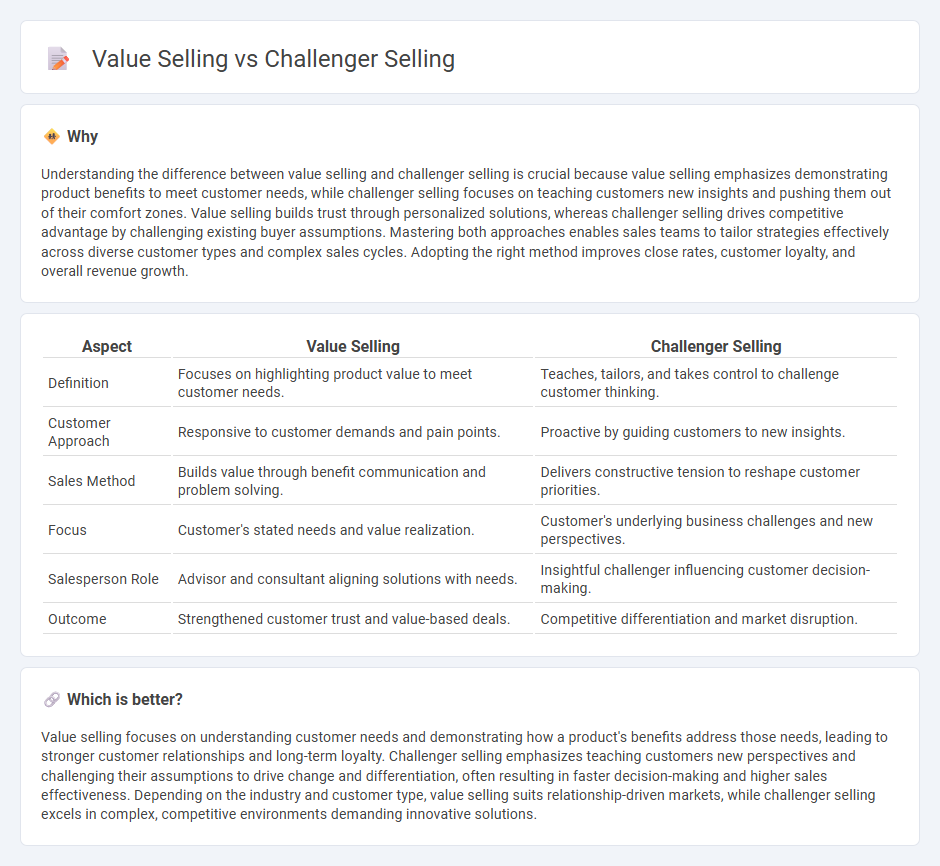
Value selling focuses on understanding customer needs and delivering tailored solutions that highlight product benefits and return on investment, enhancing perceived value. Challenger selling emphasizes teaching customers new insights, tailoring messages to their specific challenges, and taking control of the sales conversation to drive decision-making. Explore the differences between these approaches to optimize your sales strategy.
Why it is important
Understanding the difference between value selling and challenger selling is crucial because value selling emphasizes demonstrating product benefits to meet customer needs, while challenger selling focuses on teaching customers new insights and pushing them out of their comfort zones. Value selling builds trust through personalized solutions, whereas challenger selling drives competitive advantage by challenging existing buyer assumptions. Mastering both approaches enables sales teams to tailor strategies effectively across diverse customer types and complex sales cycles. Adopting the right method improves close rates, customer loyalty, and overall revenue growth.
Comparison Table
| Aspect | Value Selling | Challenger Selling |
|---|---|---|
| Definition | Focuses on highlighting product value to meet customer needs. | Teaches, tailors, and takes control to challenge customer thinking. |
| Customer Approach | Responsive to customer demands and pain points. | Proactive by guiding customers to new insights. |
| Sales Method | Builds value through benefit communication and problem solving. | Delivers constructive tension to reshape customer priorities. |
| Focus | Customer's stated needs and value realization. | Customer's underlying business challenges and new perspectives. |
| Salesperson Role | Advisor and consultant aligning solutions with needs. | Insightful challenger influencing customer decision-making. |
| Outcome | Strengthened customer trust and value-based deals. | Competitive differentiation and market disruption. |
Which is better?
Value selling focuses on understanding customer needs and demonstrating how a product's benefits address those needs, leading to stronger customer relationships and long-term loyalty. Challenger selling emphasizes teaching customers new perspectives and challenging their assumptions to drive change and differentiation, often resulting in faster decision-making and higher sales effectiveness. Depending on the industry and customer type, value selling suits relationship-driven markets, while challenger selling excels in complex, competitive environments demanding innovative solutions.
Connection
Value selling and challenger selling both prioritize understanding customer needs to drive sales success, with value selling focusing on demonstrating how a product or service uniquely meets those needs. Challenger selling emphasizes teaching, tailoring, and taking control of the sales conversation by challenging customers' assumptions, which reinforces the value proposition presented. Integrating these approaches enables sales professionals to deliver compelling, insight-driven solutions that create differentiated value and secure customer commitment.
Key Terms
**Challenger Selling:**
Challenger Selling centers on teaching sales representatives to challenge customers' existing beliefs, providing unique insights that reframe the buyer's perspective and drive decision-making. This approach emphasizes assertive communication, tailoring sales conversations to individual customer needs, and taking control of the sales dialogue to create constructive tension. Discover how mastering Challenger Selling techniques can transform your sales strategy and boost performance.
Teach
Challenger Selling emphasizes teaching customers by providing unique insights and reframing their thinking, driving value creation through education rather than just product features. This approach contrasts with Value Selling, which primarily focuses on quantifying product benefits and ROI to demonstrate value. Explore how Teach within Challenger Selling transforms customer engagement and boosts sales effectiveness.
Tailor
Tailor is a critical skill in both Challenger Selling and Value Selling methodologies, emphasizing customization of sales pitches to the specific needs and challenges of the customer. In Challenger Selling, Tailoring involves teaching customers new insights and providing tailored solutions that push their thinking, whereas Value Selling focuses on aligning the product's value with the customer's specific business outcomes and ROI expectations. Explore how Tailor techniques enhance sales effectiveness and customer engagement by learning more about these methodologies.
Source and External Links
What is the Challenger Sales Model? + 25 Discovery ... - The Challenger Sales methodology focuses on teaching customers new insights, tailoring the conversation, and taking control by showing them undiscovered challenges and the costly consequences of inaction.
What is the Challenger Sales Methodology? - This approach involves five steps: warming up with prospect knowledge, reframing their challenge for greater impact, illustrating emotional consequences, emphasizing value, and only then presenting your solution.
The Challenger Sale | Sales, Marketing, & CS Approach - Challenger selling disrupts customer assumptions by teaching, not just selling, and is especially effective in complex sales, with 60% of top-earning reps using the methodology.
 dowidth.com
dowidth.com